Disappointment results for Africa’s 2022 Qatar World Cup envoys in the AFCON finals
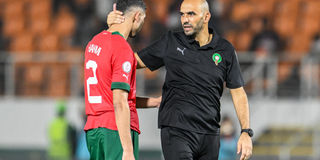
Morocco's coach Walid Regragui (R) and Morocco's defender #2 Achraf Hakimi (L) react after their loss in the Africa Cup of Nations (CAN) 2024 round of 16 football match between Morocco and South Africa at the Stade Laurent Pokou in San Pedro on January 30, 2024.
AFP
What you need to know:
- These nations, known for their footballing prowess and past successes, have faltered in the quest for glory, leaving fans and pundits alike stunned by their premature eliminations.
Dar es Salaam. The ongoing African Cup of Nations (Afcon) tournament in Ivory Coast has witnessed several unexpected results, particularly with the exit of traditional powerhouses like Senegal, Ghana, Cameroon, Tunisia, and Morocco.
These nations, known for their footballing prowess and past successes, have faltered in the quest for glory, leaving fans and pundits alike stunned by their premature eliminations.
The five nations were given the huge chance of being crowned the Afcon title, despite the fact that there were other giants like Egypt, DR Congo and the hosts nation, Ivory Coast.
In this analysis, we examine into the reasons behind these shocking results and explore their implications for African football.
Senegal

Senegal continued the poor performances of defending champions at AFCON.
AFP
As the defending champions of the tournament, Senegal entered the Afcon with high expectations. The team was under Sadio Mane, a former Liverpool and Bayern Munich player, who now plays for Al Nassr of Saudi Arabia.
The team had other super stars like Nicolas Jackson (Chelsea), Abdallah Sima (Rangers), Iliman Ndiaye, Ismaila Sarr (Marseille), Drissa Gana Gueye (Everton) and Youssouf Sabaly who plays for Spanish La Liga side, Real Betis.
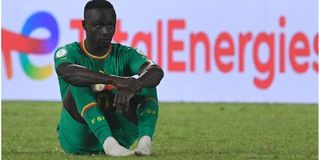
Sadio Mane left disappointed after the game against Cote d'Ivoire. Credit: @CAF_Online.
However, their journey came to an abrupt end as they were eliminated by the host nation, Ivory Coast, in penalty shootouts.
Despite their talent and pedigree, Senegal's failure to navigate past the quarter-finals underscores the unpredictable nature of knockout football and the fine margins that separate success from disappointment.
Morocco
As semi-finalists in the previous World Cup, Morocco entered the Afcon finals with the hope of securing another impressive run. However, their journey was cut short by South Africa, who delivered a stunning 2-0 upset.
Despite boasting a talented squad and strong performances in the group stage, Morocco's elimination serves as a stark reminder of the unforgiving nature of knockout football.
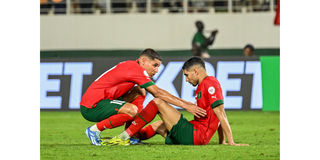
The team was formed by world class stars like Achraf Hakimi (PSG), Abdelkabir Abqar (Deportivo Alavés), Nayef Aguerd (West Ham), Chadi Riad (Betis), Noussair Mazraoui (Bayern Munich), Selim Amallah (Valencia), Amir Richardson (Stade de Reims), Oussama El Azzouzi (Bologna FC), Sofyan Amrabat (Manchester United), Hakim Ziyech (Galatasaray) and Youssef En-Nesyri who plays for Sevilla.
Morocco had the best results in group F after collecting seven points with two wins, 3-0 against Tanzania and 1-0 against Zambia. The team also recorded a 1-1 draw against DR Congo.
The CAF’s top ranked African team were eliminated by South Africa after being defeated 2-0.
Ghana
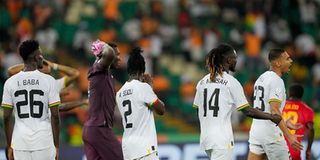
Ghana players react after the African Cup of Nations Group B soccer match between Mozambique and Ghana in Abidjan, Ivory Coast, Monday, Jan.22, 2024. PHOTO | COURTESY
Ghana, a perennial powerhouse in African football, also endured a disappointing campaign in the Afcon.
Placed in a challenging group alongside Cape Verde, Egypt, and Mozambique, the Black Stars failed to advance to the top 16 after finishing third with just two points.
This unexpected outcome highlights the competitive nature of modern football, where even traditional giants can falter against determined opposition. Ghana won the title in 1982 during the finals held in Libya. It is about 40 years now the nation has won the title, despite having world class football players featuring in European leagues.
Cameroon
Despite having qualifued for the top 16 teams, Cameroon failed to make an impact in the knockout stage, succumbing to a 2-0 defeat by Nigeria.

Cameroon's forward #11 Georges-Kevin Nkoudou reacts to a missed chance during the Africa Cup of Nations (AFCON) 2024 group C football match between Gambia and Cameroon at Stade de la Paix in Bouake on January 23, 2024.
The Indomitable Lions, known for their resilience and firmness, were unable to replicate their past glories, signaling a potential shift in the footballing landscape of the continent. Cameroon last won the title in 2017.
Tunisia
Tunisia's inability to qualify for the top 16 further adds to the narrative of disappointment for African football fans.
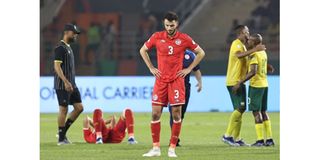
Tunisia's defender #3 Montassar Talbi reacts following the Africa Cup of Nations (CAN) 2024 group E football match between South Africa and Tunisia on January 24, 2024.
AFP
Placed at the bottom of their group standings with just two points, the Carthage Eagles failed to soar in the 2023 edition of the tournament in which their expectations were high.
This setback raises questions about the state of Tunisian football and the challenges they face in competing at the highest level.
Implications for African Football
The shock results of Senegal, Ghana, Cameroon, Tunisia, and Morocco in the 2023 Afcon finals carry significant implications for African football as a whole.
Tanzania’s Sports Development Director, Ally Mayay said what is going on the Afcon finals shows how African countries on the continent have invested in football and now attain the highest development.
Mayay gave the example of Cape Verde who managed to qualify for the knockout stage of the competition by stunning the so-called African giants.
"If you analyse Cape Verde’s national team that played against Tanzania a few years ago, you can see how that team has achieved success after changing mindsets in the game and invest more in youth’s development.
“Who thought about Cape Verde, Guinea and Angola that they would reach the stage? Who also thought about Egypt, Morocco, Algeria, Cameroon, Ghana, Tunisia and Senegal that they would be eliminated from this stage and others in the group’s stage?
“There are positive changes in African football towards which Tanzania are moving too," said Mayay.
Mayay also urged the Tanzania Football Federation (TFF) to continue developing talents for the future use of the national team in international competitions, casting hope that soon the team would be among the African football powerhouses.
These outcomes highlight the growing competitiveness within the continent, with emerging nations posing a serious threat to established powerhouses.
Additionally, they underscore the need for continuous improvement and development across all levels of African football, from grassroots to elite competitions.
Further, these results may prompt self-examination and reassessment within the footballing structures of the affected nations, as they seek to address underlying issues and bounce back stronger in future tournaments.
Moreover, it highlights the importance of mental resilience and tactical adaptability in navigating the challenges of tournament football, where every match holds the potential for both triumph and heartbreak.
In conclusion, the shock results of Senegal, Ghana, Cameroon, Tunisia, and Morocco in the 2023 Afcon tournament serve as a reminder of the unpredictable nature of football and the need for constant evolution within the sport.
While disappointment may linger in the short term, these setbacks can also serve as a catalyst for growth and renewal, paving the way for a brighter future for African football on the global stage.




